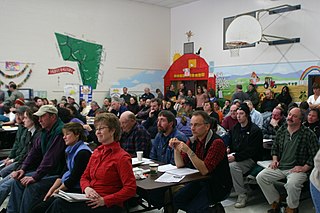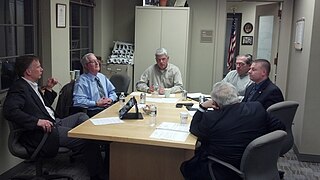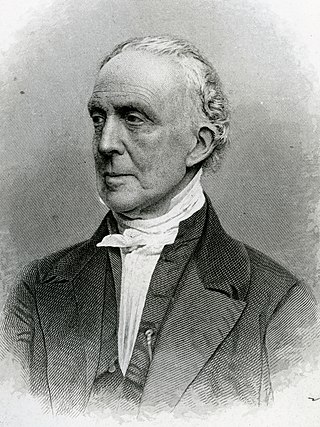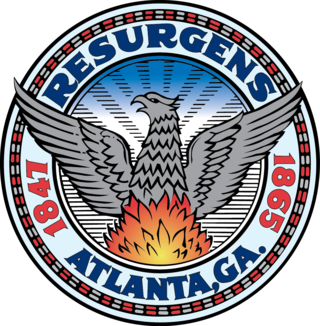Related Research Articles

Town meeting, also known as an "open town meeting," is a form of local government in which eligible town residents can directly participate in an assembly which determines the governance of their town. Unlike representative town meeting where only elected representatives can participate in the governing assembly, any town voter may participate in an open town meeting. This form is distinct from town hall meetings held by elected officials to communicate with their constituents, which have no decision-making power.

The select board or board of selectmen is commonly the executive arm of the government of New England towns in the United States. The board typically consists of three or five members, with or without staggered terms. Three is the most common number, historically.

The mayor of Boston is the head of the municipal government in Boston, Massachusetts, United States. Boston has a mayor–council government. Boston's mayoral elections are nonpartisan, and elect a mayor to a four-year term; there are no term limits. The mayor's office is in Boston City Hall, in Government Center.

The Los Angeles City Council is the lawmaking body of Los Angeles, California, United States. It has 15 members from 15 council districts that are spread throughout the city.
Massachusetts shares with the five other New England states a governmental structure known as the New England town. Only the southeastern third of the state has functioning county governments; in western, central, and northeastern Massachusetts, traditional county-level government was eliminated in the late 1990s. Generally speaking, there are four kinds of public school districts in Massachusetts: local schools, regional schools, vocational/technical schools, and charter schools.

Kevin Hagan White was an American politician best known for serving as the mayor of Boston for four terms from 1968 to 1984. He was first elected to the office at the age of 38. He presided as mayor during racially turbulent years in the late 1960s and 1970s, and the start of desegregation of schools via court-ordered busing of school children in Boston. White won the mayoral office in the 1967 general election in a hard-fought campaign opposing the anti-busing and anti-desegregation Boston School Committee member Louise Day Hicks. Earlier he had been elected Massachusetts Secretary of the Commonwealth in 1960 at the age of 31, and he resigned from that office after his election as Mayor.

Josiah Quincy III was an American educator and political figure. He was a member of the U.S. House of Representatives (1805–1813), mayor of Boston (1823–1828), and President of Harvard University (1829–1845). The historic Quincy Market in downtown Boston is named in his honor. A panel of 69 scholars in 1993 ranked him among the ten best mayors in American history.

John Phillips was an American politician, serving as the first mayor of Boston, Massachusetts, from 1822 to 1823. He was the father of abolitionist Wendell Phillips.

The Boston City Council is the legislative branch of government for the city of Boston, Massachusetts, United States. It is made up of 13 members: 9 district representatives and 4 at-large members. Councillors are elected to two-year terms and there is no limit on the number of terms an individual can serve. Boston uses a strong-mayor form of government in which the city council acts as a check against the power of the executive branch, the mayor. The council is responsible for approving the city budget; monitoring, creating, and abolishing city agencies; making land use decisions; and approving, amending, or rejecting other legislative proposals.

Joseph Milner Wightman was an American politician who, from 1861 to 1863, served as the seventeenth Mayor of Boston, Massachusetts.

Nathaniel Bradstreet Shurtleff, Sr. was an American politician, serving as the twentieth mayor of Boston, Massachusetts from January 6, 1868 to January 2, 1871.
Local government in New Jersey is composed of counties and municipalities. Local jurisdictions in New Jersey differ from those in some other states because every square foot of the state is part of exactly one municipality; each of the 564 municipalities is in exactly one county; and each of the 21 counties has more than one municipality. New Jersey has no independent cities, or consolidated city-counties.

The Atlanta City Council is the main municipal legislative body for the city of Atlanta, Georgia, United States. It consists of 16 members: the council president, twelve members elected from districts within the city, and three members representing at-large posts. The city council is the legislative branch of the Atlanta city government.
The city government of Chelsea, Massachusetts was incorporated in 1857. From 1739 to 1857, Chelsea was incorporated as a town. From 1857 to 1991, the city's head of government was the mayor of Chelsea. The office of mayor ceased to exist after the city went into receivership. Since 1995, Chelsea has been led by a city manager.

Tito Jackson is an American politician who was a member of the Boston City Council. He represented council District 7, representing parts of the Roxbury neighborhood and parts of Dorchester, South End, and Fenway. In 2017, he ran unsuccessfully for mayor of Boston. After leaving the Boston City Council, Jackson worked in the cannabis industry. In 2022, Boston Mayor Michelle Wu appointed Jackson to the city's Commission on Black Men and Boys.
The Town Manager of Saugus, Massachusetts, is the chief administrative manager of Saugus, Massachusetts. Saugus has a Town Manager/Representative town meeting system of government. The Town Manager’s Office is located in Saugus Town Hall. Scott Crabtree has been town manager since March 30, 2015 and previously held the position from 2012 to 2014.

The Boston City Charter is a series of State statutes which codifies a system of rules for the government of the City of Boston, Massachusetts. The Charter is not a typical city constitution but rather a series of amendments, General Court rulings, and case law which form the basis of government. The central organs of the Boston City Charter are the Mayoral Office and City Council. The composition of these offices, their term length, manner of election, and scope of power have changed throughout the years.

Tania Fernandes Anderson is a Cape Verdean-born American politician and non-profit executive who is a member of the Boston City Council for the 7th district. A Democrat, she was elected in 2021 to succeed Kim Janey and represents Roxbury, Dorchester, and part of the South End. She is the first practicing Muslim elected to the Council.
From 1822 until 1909, Boston's legislative body was bicameral, with a Board of Aldermen that was elected at-large and a much larger Common Council with members that was elected from multi-member wards. This city legislature was replaced in 1909 with the unicameral body that is the modern Boston City Council.
References
- 1 2 3 4 5 6 7 8 9 10 11 12 13 14 15 "History Of The Boston School Committee Structure" (PDF). bmrb.org. Boston Municipal Research Bureau, Inc. September 6, 1996. Retrieved 3 December 2023.
- ↑ "Boston (Mass.). School Committee | ArchivesSpace Public Interface". archives.boston.gov. City of Boston. Retrieved 3 December 2023.
- ↑ Ross, Elizabeth (November 7, 1991). "Boston's Flynn Is In Like . . . Flynn!". Christian Science Monitor.
- ↑ Bradley, Ann (January 8, 1992). "Boston Mayor Names Members to Revamped School Board". Education Week. Retrieved December 3, 2021.
- ↑ Mazzaglia, Frank (November 1, 2014). "Everyone's favorite uncle". MetroWest Daily News. Retrieved November 1, 2022.
- 1 2 "Without Mayor Walsh, Does Anyone Support His Appointed Boston School Committee?". www.wgbh.org. WGBH. 11 February 2021. Retrieved 6 November 2022.